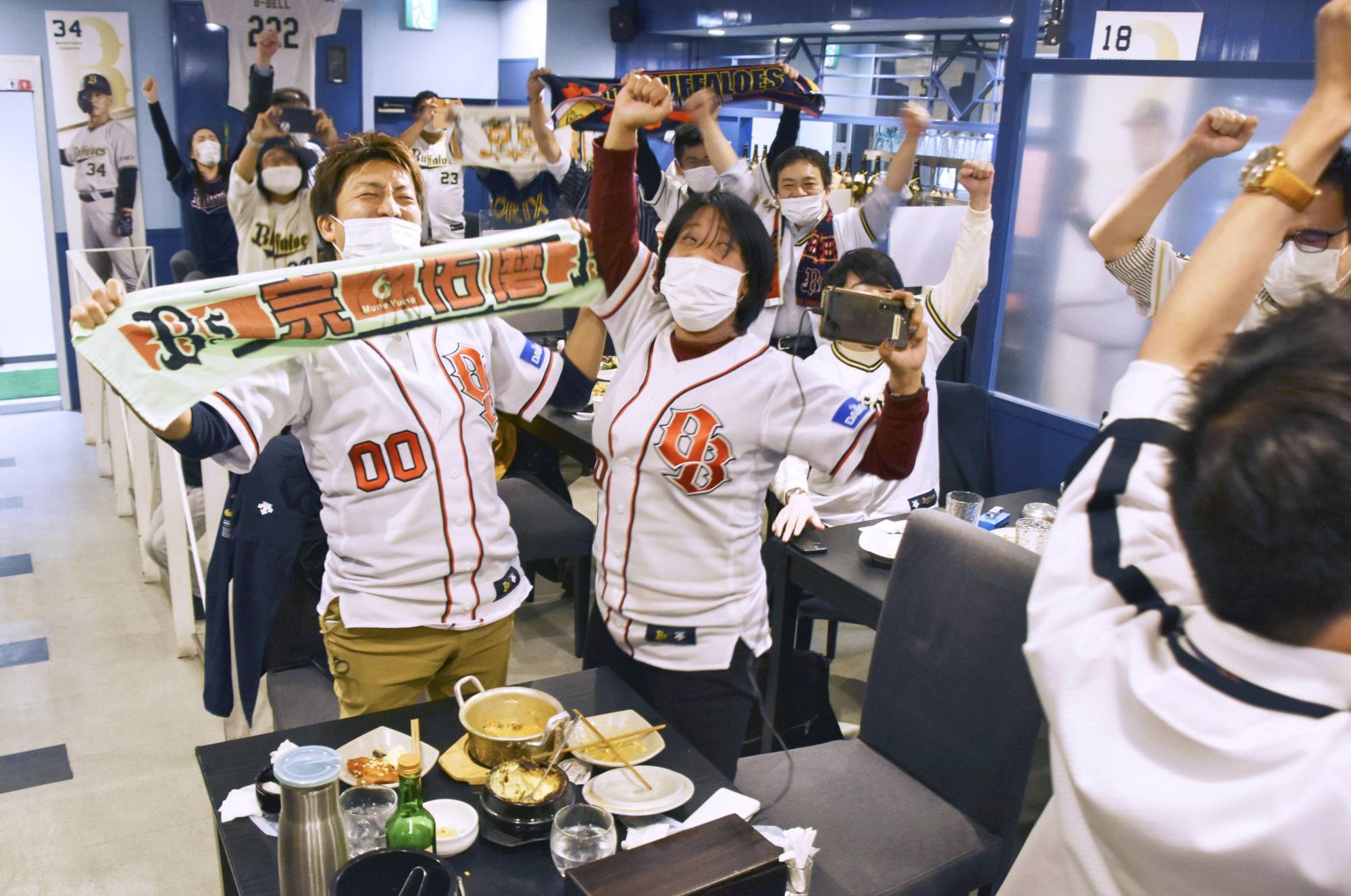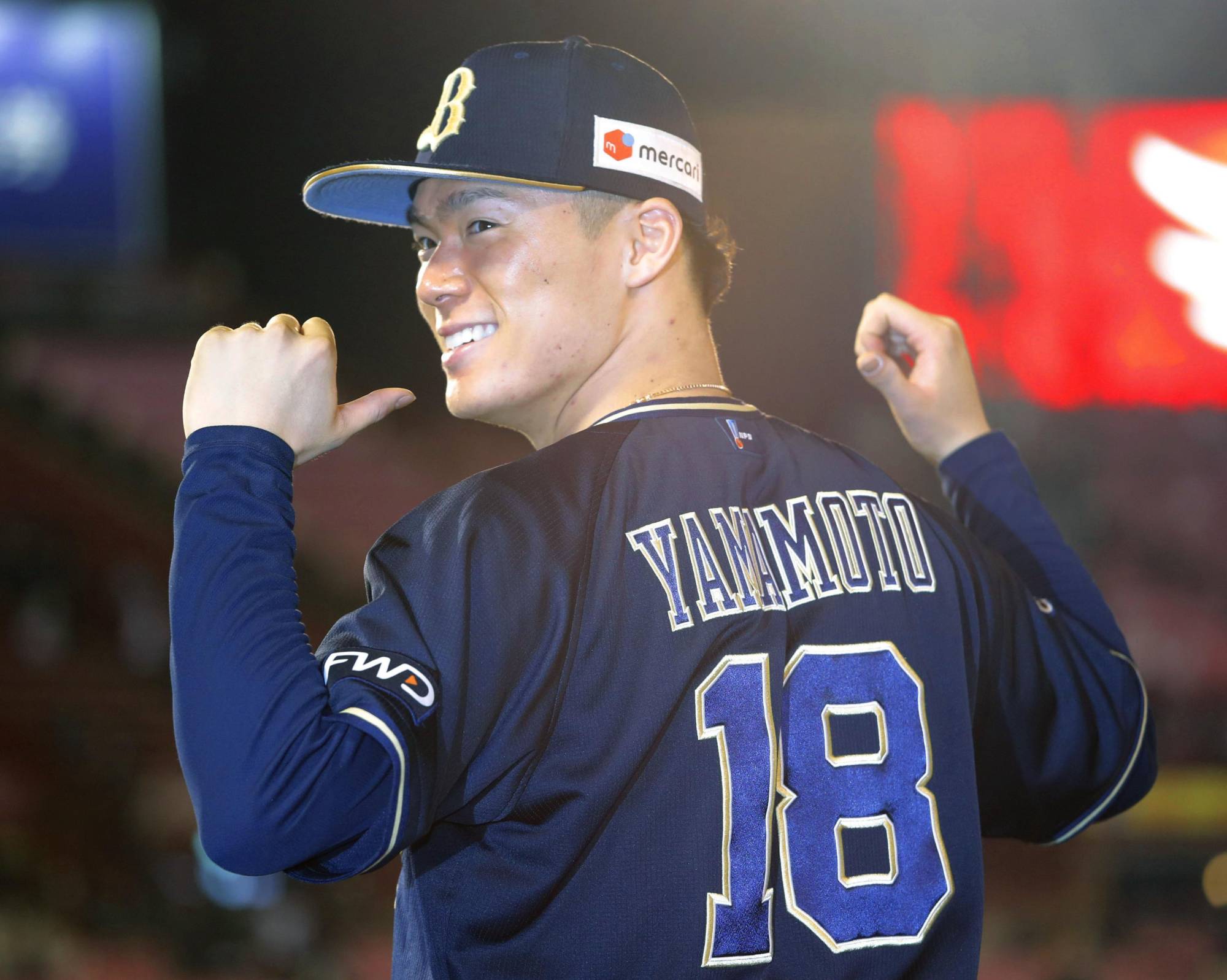There was nothing more for Yoshinobu Yamamoto to do — so he rested.
The Orix Buffaloes’ brilliant 23-year-old pitcher carried the team to the brink of the Pacific League pennant with a shutout in the club’s season finale on Monday, but the rest was out of his talented hands. The team still needed a favorable result from the matchup between the second-place Chiba Lotte Marines and Tohoku Rakuten Golden Eagles on Wednesday. So on Tuesday, Yamamoto took it easy and “didn’t do anything special.”
On Wednesday, Yamamoto was back on the mound at Kyocera Dome, but instead of pitching, he was surrounded by his jubilant teammates as they celebrated the end of a drought that began before he was even born as the Buffaloes, for the first time in 25 years, were finally able to call themselves Pacific League champions again.
The Eagles’ 2-1 win over the Marines on Wednesday in Sendai clinched the title for Orix, a long-suffering club that hadn’t won a pennant since 1996 — when Ichiro Suzuki was wearing a BlueWave uniform — and had only enjoyed four winning seasons since 1999.
After years of dwelling in the lower reaches of the league, the Buffaloes stepped back into the light with a stunning performance that was jump started with a 12-5-1 romp through the interleague schedule in the spring.
“I really want to thank all the fans who have been waiting for Orix to win the title and kept cheering for us even while we were losing,” Yamamoto said during a news conference Wednesday night.
The celebration among Orix fans was made even sweeter by the disappointments the club has endured since its last title. The Buffaloes entered this season after finishing in last place in 2019 and having an even worse year in 2020, when they finished 27 games out of first place. Prior to this year, the club’s last season with a winning record came in 2014, when it finished second to the Fukuoka SoftBank Hawks by two percentage points.
Even when the Buffaloes had star players, such as sluggers Takahiro Okada and Tuffy Rhodes and top-level pitchers in Chihiro Kaneko and Yuki Nishi, the team still mostly resided in the bottom half of the standings. In many years, it seemed like the Buffaloes could not get out of their own way, even at the front-office level, as evidenced by their disastrous attempted signing of pitcher Jeremy Powell in 2008.
Okada made his debut with the Buffaloes in 2006 and was part of many of the lean years. He said clinching the title Wednesday was the best feeling of his life.
“I’ve been alive for 33 years and this has to be No. 1,” he said.
Okada was a big piece of the team that came agonizingly close to winning the title in 2014 and can now celebrate being part of the squad that got over the hump and pushed those past shortcomings into the rearview mirror.
“I don’t really look back at that year too much,” Okada said. “When I think about it now, some of that disappointment became motivation and now I’m happy to have had that experience because of how happy I am to win this year. Other than myself, I think there are fans who have also been disappointed, so I want to thank them.”

These Buffaloes were not hindered by the ghosts of past seasons. When things got tough, they didn’t fall apart and continued to move forward. When star outfielder Masataka Yoshida went down with an injury late in the year, the team kept finding ways to stay in the race.
Orix had veterans such as Okada and Yoshihisa Hirano on the roster, but an injection of youth, from players such as Yamamoto, 20-year-old pitcher Hiroya Miyagi, 25-year-old batter Yuma Mune and others kept the club energized.
Okada, like Ichiro before him, was the team’s biggest star at one point. That position is now — and unquestionably — filled by Yamamoto, who had already established himself as one of Japan’s elite arms before somehow finding another gear this year and becoming the driving force for a pitching staff that is second in the Pa League with a 3.31 ERA.
“I think what fueled my performance was the support I got from people behind the scenes, such as the trainers who managed my condition every week and the people who caught for me during practice,” Yamamoto said.
Yamamoto (18-5) won his final 15 decisions of the season and is already assured of the pitching Triple Crown as he leads the PL — and all of NPB — in wins, ERA (1.39) and strikeouts (206). Yamamoto also leads NPB with a 0.85 WHIP and with 193⅔ innings pitched.
“I think the numbers I had were beyond my actual ability and because of the support I had from various people,” Yamamoto said. “So I just feel really grateful.”
He’ll be a strong candidate to win the MVP award — just like Ichiro in 1996. He’s shaping up as the best pick from the 2016 draft, when the Buffaloes took him out of high school with their fourth selection. Since becoming a full-time starter in 2019, Yamamoto is 34-15 with a 1.79 ERA.
He also had help, mainly from Miyagi, who finished 13-4 with a 2.51 ERA in 23 starts.

As important as pitching is, however, the hurlers need help from the lineup, and that is where Orix really shined this season. Yamamoto and company pitched well last year, too, but didn’t have the run support to back it up.
That wasn’t a major issue, as the Buffaloes experienced a power surge this season and lead the PL with 133 home runs. Most of them came off the bat of Yutaro Sugimoto, a big slugger who had a breakout campaign. Sugimoto, who had only played in 76 games over the previous five years, currently leads the league with 32 home runs, is third with a .301 batting average and also has 83 RBIs.
He was also a source of levity with his popular home run performance, during which he stands tall and makes a fist with his arm stretched skyward — mimicking a pose from the character Raoh from the manga “Fist of the North Star.” He used that name during the weekend Buffaloes players wore nicknames on their uniforms — Okada was simply “T-Okada” — and did the pose again during Wednesday’s news conference.
Yoshida hit 21 home runs and had a .339 average through 110 games before going down with injury, while Okada chipped in with 17 long balls, and Steven Moya finished with 13.
The Buffaloes were outscored by 60 runs last season — only the Seibu Lions had a worst run differential. This year, the team finished on the plus side, outscoring its opponents 551-500.
Orix has finally exorcised its past demons, but the job isn’t over. The 1996 BlueWave won the pennant and went on to capture the Japan Series, winning one year after the Great Hanshin Earthquake devastated their hometown of Kobe.
The atmosphere around the Buffaloes has shifted and the change has been reflected in their play.
Capturing the league title means the Buffaloes will begin their postseason in the final stage of the Pacific League Climax Series against the winner of the first stage series between the Marines and Eagles that will be played in Chiba next week.
“I’m relieved we were able to win the league, but I want to refocus my mind and win the final stage and the Japan Series,” Okada said.
Orix has a great chance to take this special season all the way to its first Japan Series appearance since 1996. The club will host the entire final stage and begin the six-game series with a one-game advantage and presumably with Yamamoto on the mound.
“We were able to win the league and we’re going to do our best to become No. 1 in Japan,” Yamamoto said.
In a time of both misinformation and too much information, quality journalism is more crucial than ever.
By subscribing, you can help us get the story right.
Source : Baseball – The Japan Times